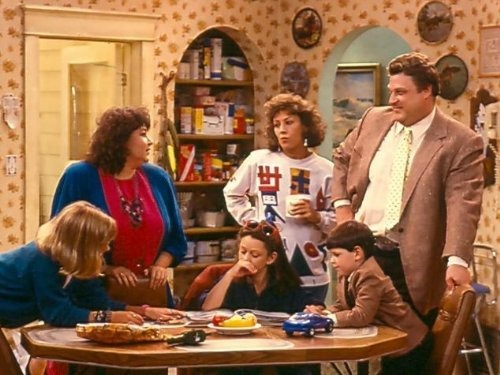
The Legacy of Roseanne: How an Iconic Sitcom Redefined American Television
October 18, 1988, marked the debut of Roseanne, a groundbreaking sitcom that quickly became one of the most watched and talked-about shows in American television history. Airing on ABC, Roseanne centered on the Conner family, an ordinary working-class family dealing with the trials of daily life in Lanford, Illinois. With its unique brand of humor and unflinching honesty, Roseanne challenged the conventions of traditional sitcoms, shedding light on topics often overlooked by television at the time. More than 30 years later, the show’s impact on TV, culture, and conversations about class and family dynamics remains profound.
Redefining the American Family Sitcom

Before Roseanne, sitcoms frequently depicted an idealized version of American life. Shows from the 1980s like The Cosby Show and Family Ties showcased families who were, by and large, financially secure and free of significant struggle. Roseanne, on the other hand, broke from this mold. It brought viewers into a world that felt gritty and real, where finances were tight, and problems couldn’t always be resolved by the end of a 22-minute episode.
The Conners, led by matriarch Roseanne (played by Roseanne Barr) and her husband Dan (John Goodman), were portrayed as a family facing real-life struggles. They worked long hours, dealt with economic pressures, argued with each other, and had flaws. Their lives reflected the experiences of many American families, especially those living paycheck to paycheck. For the first time, the realities of financial strain, marital disagreements, and family dysfunction were portrayed with humor but also with sensitivity, providing viewers with characters that felt as relatable as their own families.
Tackling Taboo Topics with Humor
One of Roseanne‘s most influential aspects was its willingness to discuss topics that mainstream TV largely avoided. Through its nine-season run, the show tackled issues such as mental health, gender identity, addiction, domestic abuse, and even the complexities of teenage pregnancy. At a time when these subjects were often seen as taboo or too controversial, Roseanne handled them with a blend of humor and honesty.
One standout example is the show’s portrayal of mental health. Roseanne Conner struggled with depression and anxiety, issues often dismissed or stigmatized. The show didn’t offer easy solutions but instead presented these challenges as part of everyday life, encouraging empathy and understanding. Similarly, Roseanne’s sister Jackie (played by Laurie Metcalf) dealt with the struggles of being a single, independent woman with her own emotional baggage. Each character’s struggles and triumphs contributed to Roseanne‘s reputation for breaking down societal stigmas and initiating broader conversations.
Humor That Bridged Generational and Social Divides
Part of Roseanne‘s success came from its ability to appeal to a diverse audience. The show’s humor struck a balance between biting satire and warmth, capturing the working-class perspective in a way that felt authentic and inclusive. Roseanne’s sharp wit and no-nonsense attitude appealed to both young viewers and older generations who related to her experiences. Her blunt humor provided commentary on everything from societal expectations to gender roles and class distinctions, offering a refreshing perspective that resonated across social divides.
At its core, the show maintained a commitment to portraying strong female voices and challenging traditional gender roles. Roseanne Conner was a powerful female lead—an unapologetic, hard-working mother who was the backbone of her family. Her independence and resilience paved the way for other female-centered shows, inspiring characters who were equally complex, funny, and real.
Memorable Characters and Cultural Impact

The characters in Roseanne became iconic, with each member of the Conner family bringing something unique to the table. Roseanne, the outspoken matriarch, brought humor and tough love; Dan, her supportive but flawed husband, was a relatable representation of many American fathers; and their children—Becky, Darlene, and D.J.—each had their own struggles and personalities, reflecting the issues young people faced in real life. The show also explored the often complicated but enduring relationship between sisters through Roseanne and Jackie, whose sibling bond was one of the most compelling dynamics on the show.
Through its characters and storylines, Roseanne offered viewers an experience that transcended entertainment. It became a part of the cultural conversation, reflecting the issues and experiences of working-class Americans and influencing the way future sitcoms approached storytelling. It inspired shows like Malcolm in the Middle and The Middle, which also focus on working-class families dealing with day-to-day struggles.
Roseanne‘s Revival and Legacy
Years after its original run, Roseanne remained relevant enough to inspire a revival in 2018, bringing back the Conners to an enthusiastic audience. The show’s reboot reflected modern societal changes, addressing issues such as political divisions, changing family dynamics, and the challenges of an evolving economy. However, the revival also faced controversy and ultimately ended due to comments made by Roseanne Barr. But the legacy of the original Roseanne lives on through the spinoff, The Conners, which continues the stories of the family without its titular character, tackling modern-day issues with the same humor and heart that made the original series famous.
Conclusion: A Lasting Influence on Television and Society
The impact of Roseanne on American television is undeniable. The show broke down barriers, pushing the boundaries of sitcoms to include genuine portrayals of working-class life, mental health struggles, and complex family dynamics. Roseanne Conner’s unapologetic humor, resilience, and complexity changed the expectations of female-led roles in television, inspiring countless other shows to follow suit. Through its humor, the show encouraged empathy, inviting viewers to laugh at the hardships of life while acknowledging the realities of everyday struggles.

Though Roseanne faced its share of controversies, its influence remains significant. By shifting the focus from idealized versions of family life to authentic portrayals of everyday people, Roseanne redefined what a sitcom could be and set a new standard for storytelling on television. The show didn’t just entertain—it gave voice to those who seldom saw their experiences reflected on screen. And while the Conners might not be a perfect family, they are, for many, a perfect representation of resilience, humor, and love in the face of life’s challenges.
